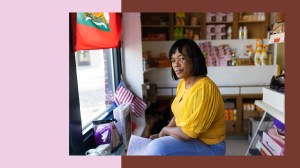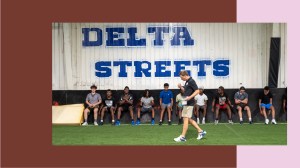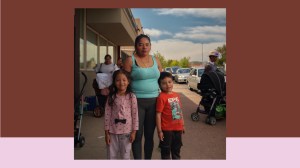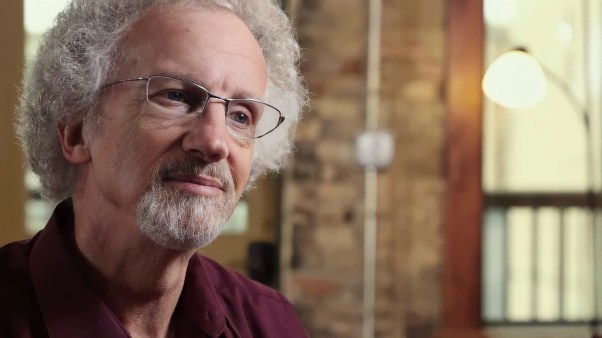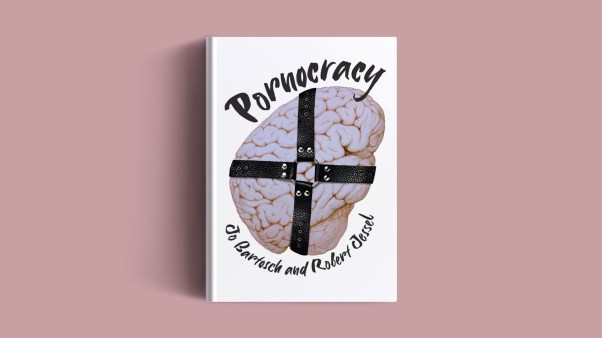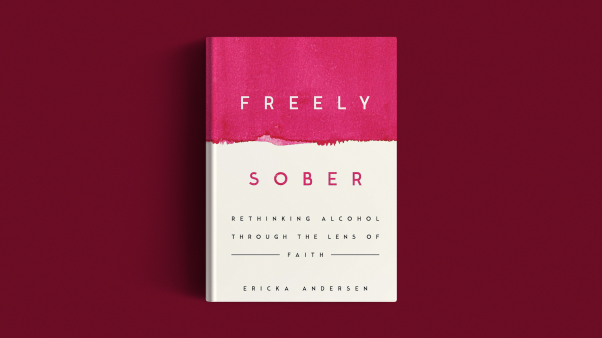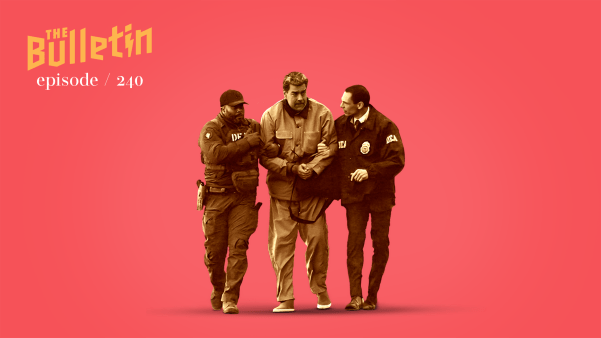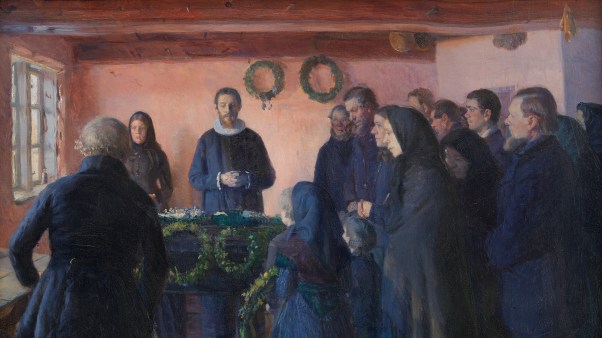In this series

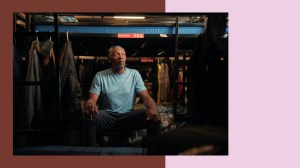
Just west of Colorado Springs, the park known as Garden of the Gods features soaring red sandstone formations. At 6,400 feet above sea level, it’s one of the loveliest places in America. Just south of downtown squats one of the ugliest. If the garden hints at the glory of God, Las Vegas Street on a Wednesday at 6:30 a.m. proclaims the wreckage of humanity.
A grizzled man wearing a Mountain Dew T-shirt sits slumped over on a bench. A man and a woman sleep under a blanket next to hypodermic needles, Budweiser cans, a ramen bowl, and a crumpled bag of barbecue potato chips. A man who has overdosed is lifted onto a stretcher and then into an ambulance. But that’s outside the gates of the 15-acre Springs Rescue Mission (SRM) at 5 West Las Vegas Street. Inside is a four-story welcome center topped with a tall cross. Behind that are Next Step shelters for those trying to leave homelessness, plus a barracks—row upon row of cots in one enormous room—for those who have decided to stay homeless but would like clean sheets for the night.
Between those buildings stands the dining hall, which at 7 a.m. serves up a bacon-and-eggs breakfast for those enrolled in the Next Step program. At 7:15, those not in the program sit on the clean, grassy lawn. At 8, they shuffle into the dining hall for a cold continental breakfast.
While they eat, staff members in the barracks move the beds and bring in chairs, in which about 100 men and women will spend their day, slouching before two big-screen televisions showing crime dramas.
In a nearby building, two dozen staff members and ex-addicts are celebrating a graduation from the Next Step addiction recovery program.
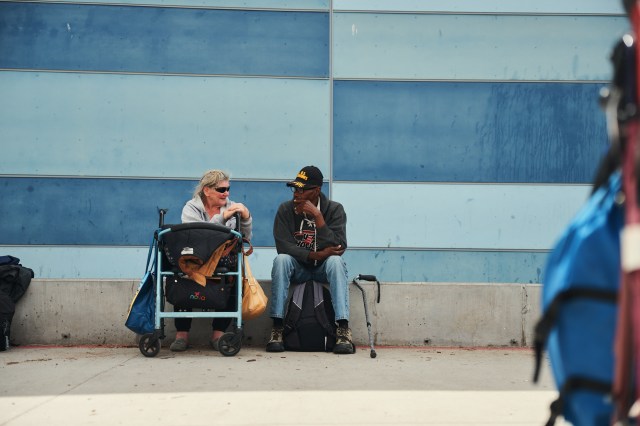 Photography by Kris Cheng for Christianity Today
Photography by Kris Cheng for Christianity TodayAt the ceremony, new graduate Brian Gilliam compared his meth and psych-ward past with his reformed and reverent present: “Thank you, God, for your peace and your joy. You loved me even when I made excuse after excuse,” he prayed, adding. “God gave me another chance to be a man. A couple of times I got kicked out of here, but more and more I want to be light to somebody instead of a vessel for disobedience.”
The addiction recovery and Next Step programs depend on private, church, and foundation funding. The ministry originated in 1994 when Marilyn and Paul Vyzourek, who had overcome their own drug and alcohol addictions, brought bagged lunches and old clothes to people sleeping under bridges and in parks and later put four beds in their basement.
SRM grew for two decades and in 2015 developed an agreement with city officials who recognized that tourists want swept streets, not street sleepers. SRM provides beds for the unhoused, and the city pumps in local money plus federal funds. Now, one-fifth of SRM’s $11 million budget comes from government grants, all of which support one-night stays at the SRM campus, which features a bronze sculpture of Jesus and Bible verses on some walls.
That funding creates controversy, as does SRM’s decision to offer better meals to those who enter a program. At a city council meeting last year, council member David Leinweber asked about the differential treatment. “Is that compassionate?” he said.
The mission’s then-CEO, Jack Briggs, responded that letting people settle into victimhood with no hope to change their lives is not compassionate: “We gently incentivize them to improve their mental, physical, and spiritual health, as well as their prospects for employment and housing.”
Gentle incentives include getting the same bed every night versus a random assignment. On a typical day, Next Steppers have a dinner of chicken and vegetables. One-day-at-a-timers get beef broth with noodles—not great, but better than junk food and life as a junkie on Las Vegas Street. Everyone gets safety (all residents must go through metal detectors), a private shower time (with soap and shampoo provided), laundry time, and a storage bin.
It takes a long time to help a person in long-term homelessness to straighten out. SRM has found that the promise of pie 18 months later is ineffective with those who for years have focused on where to get daily bread. No one needs to offer a profession of faith to gain benefits, just a commitment to take one small step toward working and having a home.
 Photography by Kris Cheng for Christianity Today
Photography by Kris Cheng for Christianity Today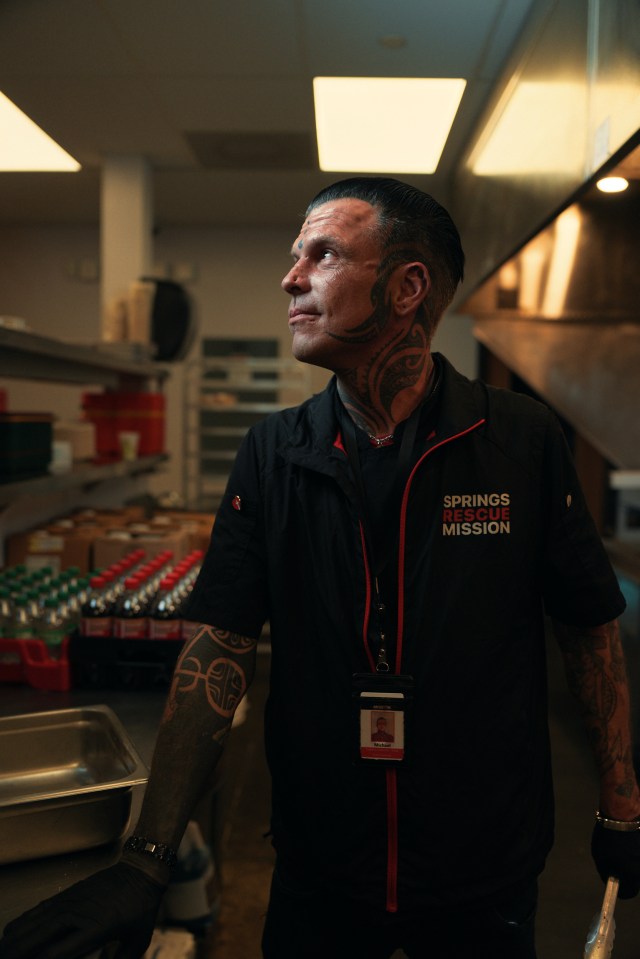 Photography by Kris Cheng for Christianity Today
Photography by Kris Cheng for Christianity Today Photography by Kris Cheng for Christianity Today
Photography by Kris Cheng for Christianity TodayColorado Springs serves as the headquarters for Focus on the Family, Compassion International, and several other evangelical groups, which gives Christians more political influence than they have in some other cities. Local officials, though, speak of SRM’s program as one that benefits both church and state. SRM sees about 220 people a year move into transitional or regular housing. Thousands come briefly, but at least they’re temporarily safe. Overall, SRM says it saves governments $12 million per year in medical, policing, social work, and other costs.
Some evangelicals criticize SRM because it does not require residents to attend chapel. That was standard in traditional urban missions, where beds and meals went only to those who listened to a sermon. But a formative SRM document declares, “God is the one who transforms. Therefore, when guests make bad choices, it’s up to God to work with them. It’s our role to help in the project, not own it.”
Other evangelicals criticize SRM because it houses those still in addiction next to recovering addicts. But in one dinner discussion, Next Step participants said such closeness helps addicts see that a better life is possible.
 Photography by Kris Cheng for Christianity Today
Photography by Kris Cheng for Christianity Today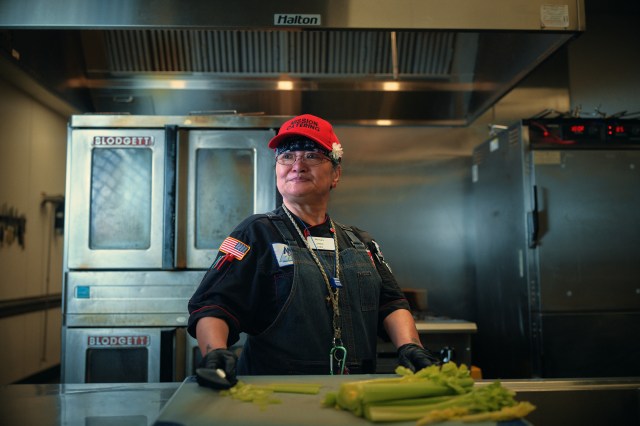 Photography by Kris Cheng for Christianity Today
Photography by Kris Cheng for Christianity Today Photography by Kris Cheng for Christianity Today
Photography by Kris Cheng for Christianity Today Photography by Kris Cheng for Christianity Today
Photography by Kris Cheng for Christianity TodayMeanwhile, the dinner line for the unhoused snaked across the courtyard. It included 90 weather-beaten men, one wearing a “Never Too Much Bacon” T-shirt, another complaining that his fifth wife had just kicked him out. It also included 29 women, most with visible tattoos, one who kept talking about how she needed to sell her plasma the next day.
One SRM staff member, Ronnie Hammers, retired from his job in the Midwest and moved to Colorado Springs eight years ago. He volunteered with SRM for a year and then joined the cause.
“I originally thought you could snap your fingers and change things,” he said. “I’ve learned that doesn’t work. I’ve also had to overcome the other tendency: playing God by thinking someone is unable to change.”
Marvin Olasky is the executive editor for news and global at Christianity Today.



